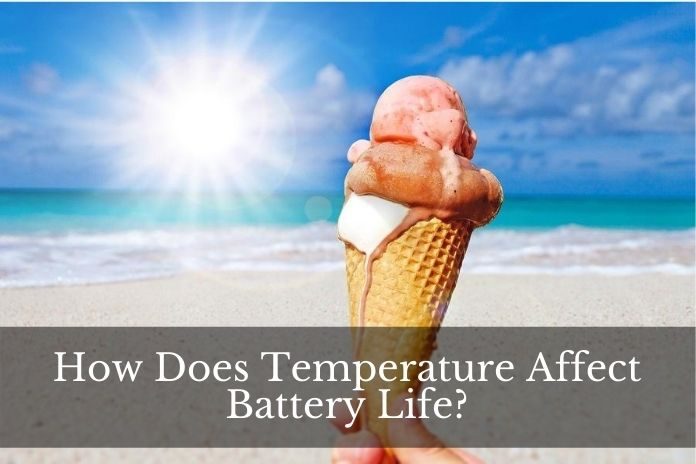
When it comes to battery-powered devices like smartphones, tablets, laptops, etc. battery life is one concern for users. Whether it is because they are more concerned about runtime or the service years the battery can offer, battery life is a significant aspect for users. It is one of the things that people check first before deciding to buy a particular device.
However, as established as it is, this is an aspect that is almost uncontrollable because there’s a lot of factors that have significant effects on it. One of these factors is temperature, a dynamic facet that none of us can control.
How does temperature affect battery life? Temperature directly affects how a battery operates, which also affects its capacity or battery life. According to experts, as the temperature drops down, the battery’s capacity reduces.
On the other hand, when the temperature rises, the size of the battery also increases. However, although the capacity of a battery increases at high temperatures, it is the opposite of its battery life, which is shortened. Generally, a cell’s capacity reduces up to 50% when the temperature reaches 22 °F, but its battery life up to 60%.
In a situation where the temperature reaches 77 °F the cell’s battery life drops down to 50% and will gradually reduce for every 15 °F over the 77 °F. This is true for all lead-acid batteries. When it comes to the extreme, the effects are more severe and may also take a toll on batteries’ lifespan.
When the temperature gets higher than the cell’s operating range, it can trigger corrosion within batteries, while extreme cold weakens its plates to store charge. Then the transition between the two extremes will also have more devastating effects on both battery life and lifespan of a power cell.
Finding you here reading my article tells me that you are eager to learn more about batteries, primarily how temperature influences its behavior.
It is a fact that a lot of car batteries today are greatly affected by how hot or cold a day is, and it is also true with other kinds of cells. Come and join me as we investigate the effects of temperature on batteries.
A Detailed Look on the Effects of Temperature on Batteries
Earlier I mentioned that temperature influences how a battery behaves or operates, which directly relates to its capacity and battery life.
According to experts, there are several ways on how a cell is affected by temperature. Apart from the way batteries operate, the variation in temperature also affects its charging state. The temperature within the battery and the temperature of its electrolyte also affect the cells when it comes to its state of charge, capacity, and service life.
In cases of extreme conditions, the changes in temperatures affect both a battery’s longevity and battery life. Scorching hot and freezing cold conditions have a significant impact on a cell’s wear and tear that severely affects its health, leading to a shorter lifespan.
Let’s dig deeper into these effects by breaking them down to particular sections.
The Variations or Fluctuations on Temperature and Charging
Besides the operation range of a battery where it delivers optimum performance provided that the temperature is within the range. The changes in temperature also affect the charging voltage of a battery.
These fluctuations on the charging voltage can vary from 2.74 volts per battery cell when the temperature is at -40 °C to 2.3 volts per cell at 50 °C. This is the reason why lead-acid battery chargers should have temperature corrections or control when the temperature is out of range.
The Effects of the Temperature Within the Battery Itself
The air and temperature within the cell also have a significant effect on a battery’s behavior and capacity.
In this case, there’s what experts call “thermal mass,” which means that due to having more mass, the interior temperature of the power cell changes at a much slower rate than the ambient temperature.
This means that if a battery has a more insulated space, the temperature within it will only change up to 10 degrees over twenty-hours; even the air temperature on its surrounding varies within a range of twenty to seventy degrees.
Extreme Conditions in Temperature Impact on Batteries
In this particular aspect, we will take a closer look at the effects of extreme temperatures on car batteries. This is because it is the best example that shows how extreme cold or hot environment affects a battery. It will also clearly show how significant the toll it will have on a cell, battery life, and longevity.
According to experts, an automotive cell works well on the environment with an ambient or air temperature measured at 80 °F. On that note, over time, the temperature within the hood gradually rises to push the air temperature circulating within higher.
This slowly puts pressure on the battery little by little, which stresses the battery plates, with long term effects. However, it is considered to be normal since it is the daily wear tear of the battery.
When the temperature pushes to the extreme or when the day is extremely hot, that will be a different matter. Keep in mind that a battery that consistently operates in intense heat increases the wear and tear of the battery.
This leads to corroded interior components that weaken the power cell can deliver and lesser energy the plates can store. It may not be noticeable at first, but when it is left unaddressed, it will be indicated by shorter battery life or even shorter lifespan.
During the winter season, the normal days will have lower temperatures and even extremely cold environment. In cases like this, the lower temperature increases the battery’s internal resistance, which reduces its capacity.
Extremely cold days limit a car battery around half of its capacity, where a cell operating on ideal conditions will have a 100% battery capacity. In cold days it will operate with 50% capacity. This shortens its battery life and will also have a significant impact on its longevity.
This is why car batteries often struggle to start engines during cold days, especially when the temperature reaches the severely low.
Final Thoughts
There you go! That’s everything you have to know how temperature affects a power cell, its battery life, and its longevity. The general rule that you have to keep in mind when it comes to this matter is that, as temperature rises, its capacity increases, but its LIFE decreases and vice versa.
In extreme temperatures, the effects are more severe, and the impact can be more complicated since it also affects the battery’s longevity.





